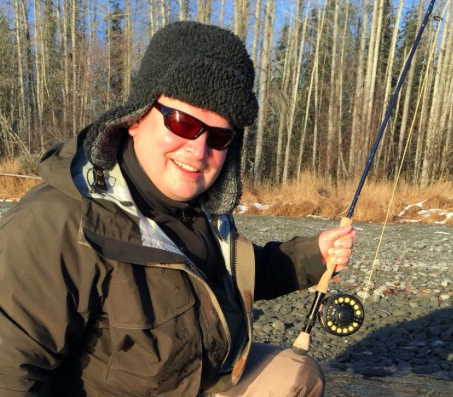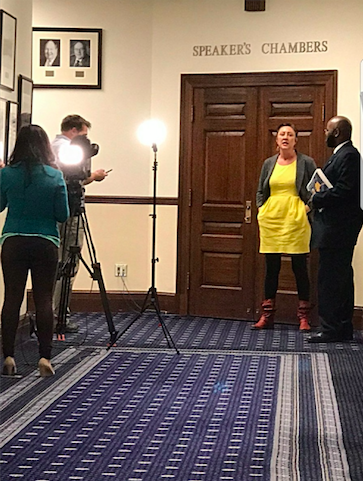STUDY HALL IS OPEN AT CHANCE U.
By ART CHANCE
SENIOR CONTRIBUTOR
There are three branches of State government: Executive, Legislative, and Judicial. For this discussion we will focus on the Executive Branch, but pay some attention to the authorities the other two branches have over the Executive branch.
The judicial branch, in addition to its criminal justice role, has the power to determine whether an action by the other two branches is in compliance with the regulations, statutes, and the Constitution.
Suits against the executive or legislative branches go to one of the four superior courts in the state and can be appealed to the Alaska Supreme Court.
Criminal matters go to either a district or superior court depending on the nature of the alleged crime and may be appealed to the court of appeals. Criminal appeals to the Alaska Supreme Court are at the discretion of the supreme court.
The Founders intended that Alaska would have a small, part-time legislature that could enact taxes and make appropriations and enact statutes to be carried out by the executive branch.
All appropriations must originate in the 40-member House of Representatives. The 20-member Senate must concur. Both bodies can pass most legislation with a simple majority vote.
A veto override and tapping the Constitutional Budget Reserve requires a three quarters vote.
If you’re interested in legislation, the important numbers are 21 and II, the votes required to pass legislation and 27 and 14, the votes required to override a veto or tap the Constitutional Budget Reserve, and if you need that six extra votes in the House and three extra votes in the Senate to get to the CBR, each vote will cost millions of dollars.
Because of the limited role of the Legislature in day-to-day governance, Alaska has a very powerful governor. The Office of the Governor is one of the few places in State government that has a view of and authority over all of the Executive Branch and has some authority over quasi-governmental organizations, corporations, and other State agencies not subordinate to one of the 14 statutorily established State departments.
The Office of the Governor includes the Office of Management and Budget (OMB), the keepers of the purse, and Boards and Commissions, the dispensary of patronage.
In addition to the governor, the Office of the Governor has a chief of staff and in some administrations a deputy chief of staff or two, several special assistants to the governor who are assigned various departments or subject matter areas, a director of Boards and Commissions and his/her support staff, the director of OMB and his/her support staff, and an administrative support staff for the Office of the Governor, as well as security staff.
The governor is statutorily the appointing authority for all employees of the Executive branch, though outside the office, that authority is largely delegated, which is not to say the governor doesn’t have say over who gets appointed.
For quasi-governmentals and other agencies that have an appointed board, the board is the appointing authority. All employees of the Office of the Governor are exempt from the State Personnel Act, the State Pay Plan, and most other legislation and regulation concerning State employees.
Likewise, employees of quasi-governmentals and other agencies outside the statutory departments are exempt from these rules and laws. As a general matter employees exempt from the State Personnel Act serve at the pleasure of the governor or the head of the agency and may be paid whatever they can get. They can be fired for any reason, no reason, but not for an illegal reason. That said, the courts have arrogated to themselves some power over Executive branch dismissals and there have been some successful wrongful discharge suits by exempt and partially exempt employees (and yes I know I haven’t really defined those terms, but I’ll get to it).
Better people than I can be the judge of how much the courts were motivated by politics in some of the wrongful discharge claims.
The Executive branch is organized into 14 statutorily established departments. The executive head of each department is the commissioner, who is appointed by the governor and subject to confirmation by the Legislature. If s/he wants to be, these are very powerful people. Most prefer to bask in the glory but some try to do something; some even have a clue what they’re doing, but the only qualification for being a commissioner is being friends with the governor and being able to get 21 and 11 to vote to confirm you. That isn’t hard; only one nominee for commissioner has ever been rejected since Statehood.
I’ve worked for a couple of truly competent commissioners and a couple who were smart enough to know what they didn’t know and were secure enough to let the directors and other subject matter experts do their jobs; the rest were wastes of oxygen. Commissioners have a deputy commissioner, who, like the commissioner, have only the qualification of being friends with the governor.
Depending on the size of the department and the administration, a commissioner can have one or two special assistants, again a political appointment that is essentially a patronage hire. Technically a special assistant is in the partially exempt service of State employment and is supposed to have some minimum qualification for the job, but a qualification other than friend of the commissioner is the exception, not the rule.
So, let me define those terms I’ve been throwing around:
The Constitution requires a “merit system of employment,” and the merit system employees are called the Classified Service.
The Division of Personnel has to publish a classification plan for all the jobs in State government and it arranges those job classifications into salary ranges.
Job classifications set out the duties and qualifications expected of a particular position and assigns a wage/salary range to that classification. Theoretically appointment to a classified position is based solely on the merit of the applicant, with some allowance for affirmative action and veterans’ preference. That is more or less true at the entry level but above the entry level, getting in the right bed or knowing the right people goes a long way.
All classified employees of the Executive Branch are unionized except for the four employees of the Alaska Labor Relations Agency. I won the case before the Alaska Labor Relations Agency that held that job classification was outside the scope of things unions could bargain and the Supreme Court upheld the decision, so while I can’t say the unions can’t play in the job classification game, they can’t if the administration doesn’t want to let them.
Next is the partially exempt service: These are division directors, assistant attorneys general, special assistants and the like — true political appointees. Alaska’s Founders wanted to have an ever so modern and progressive government, so they wanted to make sure the policy making level of State government had some semblance of qualification for their job. Partially exempt employees theoretically have to have a job classification and a job description, and have to meet minimum qualifications for their job; some do, most don’t. Friends of the commissioner or governor work to get these jobs.
The big distinction between partially exempt and classified jobs is if you get dismissed from a partially exempt job, you have no administrative appeal of your dismissal. If you have the money, time, and don’t care to ever work for the State again, you can sue; you might even win if you get fired by a Republican governor and get a Democrat judge.
And finally, there are the exempt service employees. This is a cohort of State employees to whom employment rules and laws do not apply.
The theoretical basis for the exempt service is that there are certain jobs that are either within the governor’s discretion or which cannot be recruited by normal merit system methods or because of their unique qualification cannot be recruited and paid on the States statutory State Pay Plan or under a union contract.
I knew and liked the late Dan Fauske and I like Dianne Behrends and, sorta’ like Craig Campbell, but I’ll guaran – damn – tee you that I could hire somebody who could have done their job as well as they do for a director or certainly a commissioner’s salary. Out in the quasi-governmentals, the executive head keeps the board of directors happy with travel and perks, and the board pays the executive head hundreds of thousands of dollars a years.
And then there is the worst abuse of the exempt service, the AS 39.25.110(9) temporary exempt.
This is supposed to be someone with special expertise who is engaged in a “temporary and special inquiry” into some issue on behalf of the governor.
It was intended to be a way for governors to hire “dollar a year” people to look into something for the governor. Today it is a way for people with friends in high places to get their friend or bedmate into a $100K job without regard to their qualifications or the need to have the job done.
I raised Hell with the Division of Personnel about 110(9) exempts when I was doing some work on retirement entitlements for the Correctional Officers’ Union. The DOP’s response was to stop documenting the statutory authorization for exempt appointments so they could answer a Public Records Act request by saying “no such record exists.”
Next time, we’ll get into some of the really ugly stuff.
Art Chance is a retired Director of Labor Relations for the State of Alaska, formerly of Juneau and now living in Anchorage. He is the author of the book, “Red on Blue, Establishing a Republican Governance,” available at Amazon. He only writes for Must Read Alaska when he’s banned from posting on Facebook. Chance coined the phrase “hermaphrodite Administration” to describe a governor who is simultaneously a Republican and a Democrat. This was a grave insult to hermaphrodites, but he has not apologized.













